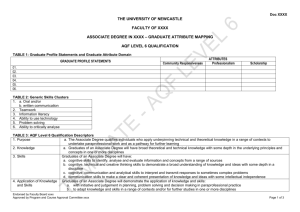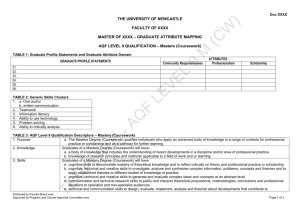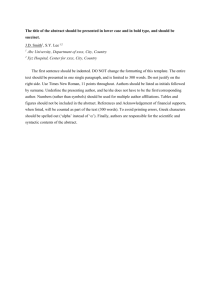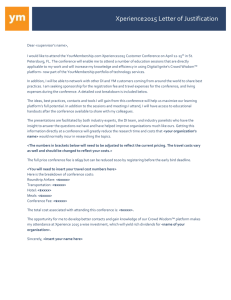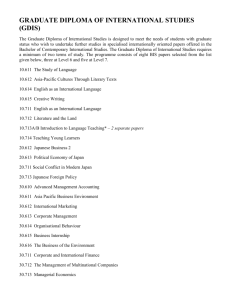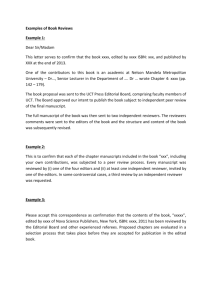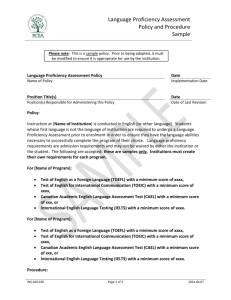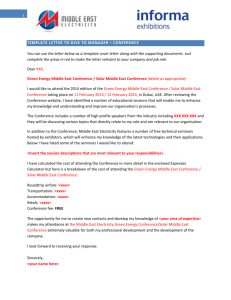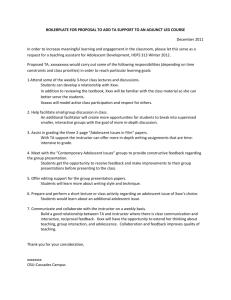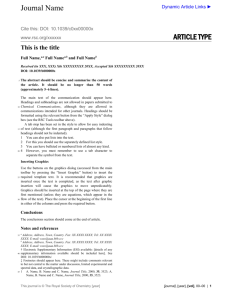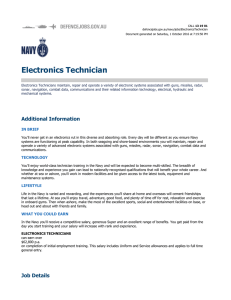AQF Level 5 Template (word doc)
advertisement
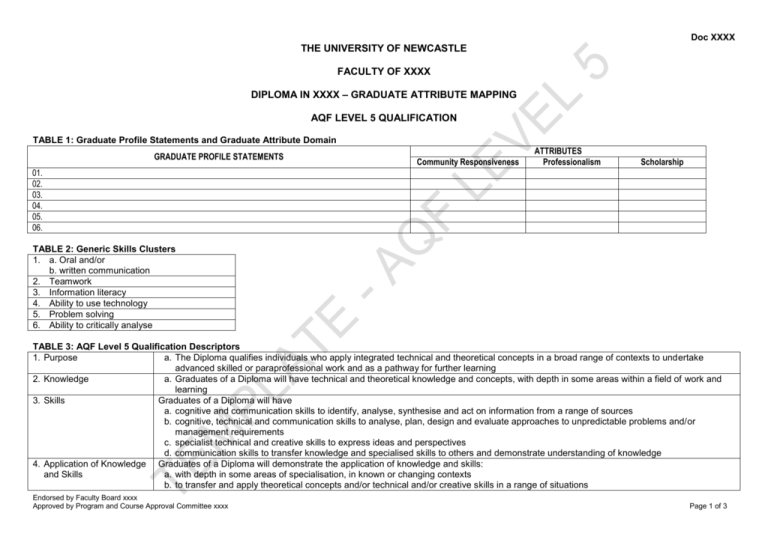
Doc XXXX THE UNIVERSITY OF NEWCASTLE FACULTY OF XXXX DIPLOMA IN XXXX – GRADUATE ATTRIBUTE MAPPING AQF LEVEL 5 QUALIFICATION TABLE 1: Graduate Profile Statements and Graduate Attribute Domain GRADUATE PROFILE STATEMENTS Community Responsiveness ATTRIBUTES Professionalism Scholarship 01. 02. 03. 04. 05. 06. TABLE 2: Generic Skills Clusters 1. a. Oral and/or b. written communication 2. Teamwork 3. Information literacy 4. Ability to use technology 5. Problem solving 6. Ability to critically analyse TABLE 3: AQF Level 5 Qualification Descriptors 1. Purpose a. The Diploma qualifies individuals who apply integrated technical and theoretical concepts in a broad range of contexts to undertake advanced skilled or paraprofessional work and as a pathway for further learning 2. Knowledge a. Graduates of a Diploma will have technical and theoretical knowledge and concepts, with depth in some areas within a field of work and learning 3. Skills Graduates of a Diploma will have a. cognitive and communication skills to identify, analyse, synthesise and act on information from a range of sources b. cognitive, technical and communication skills to analyse, plan, design and evaluate approaches to unpredictable problems and/or management requirements c. specialist technical and creative skills to express ideas and perspectives d. communication skills to transfer knowledge and specialised skills to others and demonstrate understanding of knowledge 4. Application of Knowledge Graduates of a Diploma will demonstrate the application of knowledge and skills: and Skills a. with depth in some areas of specialisation, in known or changing contexts b. to transfer and apply theoretical concepts and/or technical and/or creative skills in a range of situations Endorsed by Faculty Board xxxx Approved by Program and Course Approval Committee xxxx Page 1 of 3 Doc XXXX c. with personal responsibility and autonomy in performing complex technical operations with responsibility for own outputs in relation to broad parameters for quantity and quality d. with initiative and judgement to organise the work of self and others and plan, coordinate and evaluate the work of teams within broad but generally well-defined parameters TABLE 4: (National) Discipline Threshold Learning Outcomes Discipline Statements – Threshold Learning Outcomes For XXX Discipline 01. 02. 03. 04. 05. TABLE 5: Learning Outcomes Mapping - Programs and Courses Graduate Generic Attribute Clusters AQF Level Course Code and Name Mapping descriptors (Outcomes) Discipline Learning Outcomes Activity embedding attribute Proof of Learning Outcome attainment Endorsed by Faculty Board xxxx Approved by Program and Course Approval Committee xxxx Page 2 of 3 Doc XXXX RESOURCES: 1. Extract from the Program Management Policy and Procedure Manual [000967] Refer to Section 4: Learning Outcomes, Graduate Attributes and Generic Skills Key Words for each AQF Level AQF Level Level 5 Level 6 Level 7 Level 8 Level 9 Level 10 Key Words to use in Graduate Profile statements Undertake paraprofessional Apply Broad Coherent Apply Professional Highly Skilled Apply Advanced Specialised Expert Substantial New Knowledge Undertake skills Key Words for Each Course Level * Typical Undergrad (AQF levels 5- 8 except Graduate Certificate and Graduate Diploma) Programs Course Level 1000 level (Introductory) 2000 level (mid-program) 3000 level (senior) 4000/5000 level (advanced) PG (AQF Level 8 [Grad Cert, Grad Dip and 9 [extended and coursework] 6000 level (postgraduate) Research Higher Degrees (AQF 9 R and 10) 9000 level (RHD) Key Words to use in Proof of Learning Outcome attainment for each Graduate Profile statements Introductory Intermediate Senior Advanced Advanced Expert For 3 year programs: Foundation Mid-level Capstone Capstone Substantial Elementary Capstone New Knowledge Preliminary Specialised Growing awareness Basic *Note: 1000 (introductory), 2000 (mid program), 3000 (senior) and 4000 (advanced) level courses reflect the increasing levels of knowledge, skills, and the application of knowledge and skills expected in a course. Courses at higher levels will have assessment tasks that require a demonstration of greater depth and breadth of knowledge and greater complexity in skills. In general terms, assessment tasks at higher levels require more critical analysis, research skills and independent thinking than tasks at lower levels. 2. 3. 4. Awards and Programs Policy Suite Australian Qualifications Framework (2013) Commonwealth Government’s Office of Learning and Teaching – Learning and Teaching Academic Standards for Disciplines Endorsed by Faculty Board xxxx Approved by Program and Course Approval Committee xxxx Page 3 of 3
